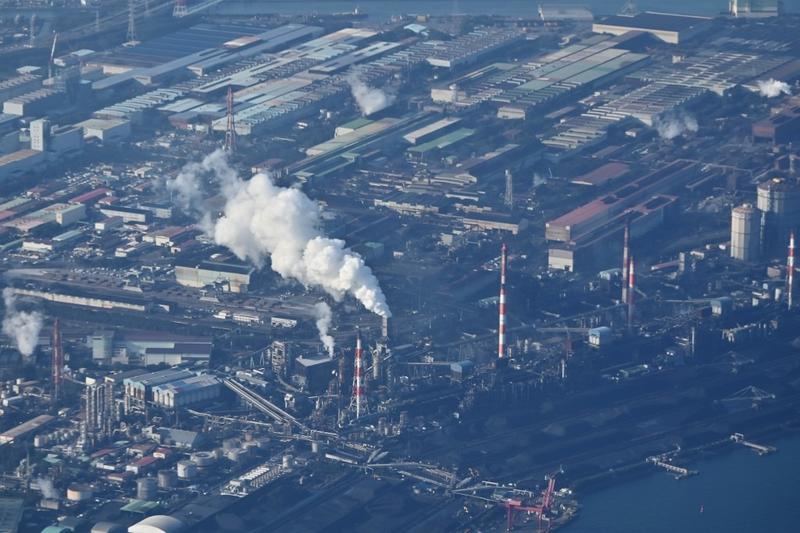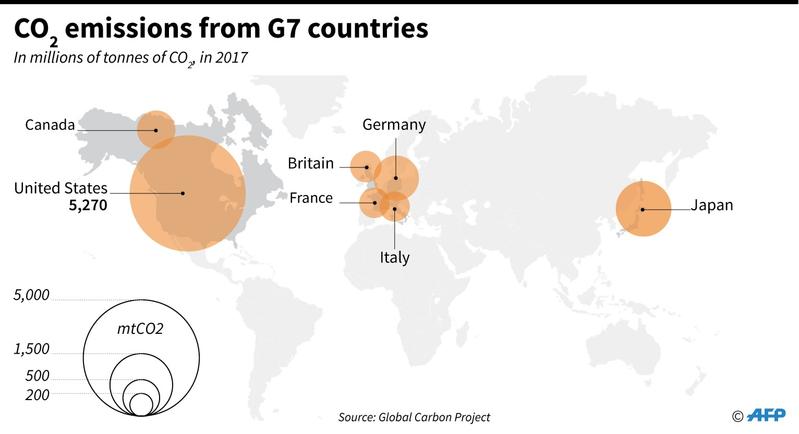 This aerial photo shows industrial plants emitting smoke in Yokohama, Japan, on Dec 16, 2019. (CHARLY TRIBALLEAU / AFP)
This aerial photo shows industrial plants emitting smoke in Yokohama, Japan, on Dec 16, 2019. (CHARLY TRIBALLEAU / AFP)
TOKYO - Japan’s powerful business lobby Keidanren is dominated by energy-intensive sectors that represent less than 10 percent of the economy, resulting in national policies that favor coal and hindering attempts to combat climate change, according to a new study.
The influence of the country’s electricity, steel, cement, car and fossil fuel sectors undermines Japan’s attempts to meet its Paris Agreement commitments, according to the report by London-based data analysis company InfluenceMap.
The Keidanren’s influence was seen last year when it argued that a target proposed by the government to reduce emissions by 80 percent by 2050 was “extremely ambitious” and pushed for any new target to be a “vision”, InfluenceMap said
The Keidanren, which has close ties with the trade and industry ministry as well as other government bodies, sits on expert panels and other forums where government policies are debated. It has acted as a ‘central negotiating point’ on climate policy for two decades, according to the report.
ALSO READ: Japan plans carbon emission cuts, more nuclear energy
While it claims to represent all of Japanese business, the claim “clearly should be questioned on climate/energy policy,” InfluenceMap said. It added the most powerful industries within Keidanren only employ about 2.7 million, while those with little influence employ 10 times that number.
Lobbying and consultation by business groups will be critical next year when the government reviews its strategic energy plan.
The Keidanren’s influence was seen last year when it argued that a target proposed by the government to reduce emissions by 80 percent by 2050 was “extremely ambitious” and pushed for any new target to be a “vision”, InfluenceMap said.
Japan later adopted a goal of achieving carbon neutrality as soon as possible in the latter half of this century, rather than an explicit 2050 emissions target.
READ MORE: Japan's zero-energy plan for all housing units
Keidanren said in a statement to Reuters it could not comment on the study as it had yet to formally receive a copy. But it added it had made policy commitments to a low carbon society and the government’s climate goals were consistent with Paris agreement goals.
Japan’s coal use has surged to record levels in the years following the 2011 Fukushima nuclear disaster. Japan is also the only G7 country working on a major rollout of coal power
InfluenceMap noted that other groups in Japan which count blue-chip firms from the retail, finance, tech and construction sectors among their members - such as the Japan Climate Initiative and Japan Climate Leaders’ Partnership - have sharply criticised the government’s climate change efforts.
The study’s findings are “mostly consistent with my personal experience as a policymaker in Japan to negotiate the Kyoto Protocol and to develop national legislation,” Hikaru Kobayashi, who was vice-minister for the environment from July 2009 to January 2011, told Reuters.
“What surprises me is that this remains unchanged today.”
Japan’s coal use has surged to record levels in the years following the 2011 Fukushima nuclear disaster that led to the shutdown of most of the country’s reactors.
Japan is also the only G7 country working on a major rollout of coal power, with companies planning to build around 20 new coal-fired plants with total capacity of about 12,000 megawatts, within a decade, a Reuters survey showed last year.
 This AFP graphic shows CO2 emissions from G7 countries in 2017.
This AFP graphic shows CO2 emissions from G7 countries in 2017.
Coal now generates 32 percent of Japan’s electricity, although the government wants that proportion to fall to 26 percent and renewables to climb to 22-24 percent from around 18 percent currently by 2030.
Using government statistics, InfluenceMap ranked business sectors by economic importance and then assessed the influence of industry associations both within the Keidanren and outside the Keidanren.
It chose 50 groups for the purposes of the study, ranking them using two metrics - how supportive a group is of climate policies that meet Paris goals and how intensely a group engages with the government on climate policy.


